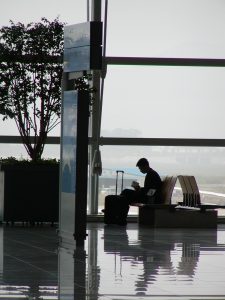 On January 27, 2017, President Trump signed an executive order banning individuals from seven predominantly Muslim countries (Sudan, Somalia, Iran, Iraq, Libya, Yemen, and Syria) from entering the United States. On February 3, 2017, a federal judge in Washington issued a temporary restraining banning the Federal Government from enforcing the order. The temporary restraining order was later upheld by the Ninth Circuit Court of Appeals on February 9, 2017.
On January 27, 2017, President Trump signed an executive order banning individuals from seven predominantly Muslim countries (Sudan, Somalia, Iran, Iraq, Libya, Yemen, and Syria) from entering the United States. On February 3, 2017, a federal judge in Washington issued a temporary restraining banning the Federal Government from enforcing the order. The temporary restraining order was later upheld by the Ninth Circuit Court of Appeals on February 9, 2017.
Based on the Ninth Circuit’s ruling, President Trump withdrew the executive order, and signed a new executive order on March 6, 2017. Among other things, the new order bans foreign nationals from six of the original countries listed in the first order (Iraq is excluded), from entering the United States if they do not currently have a valid visa to enter the United States. In addition, unlike the first order, which had a blanket ban against travel from citizens of those countries, citizens of the six affected countries may travel to the United States if they: (1) are U.S. lawful permanent residents; (2) are traveling on a diplomatic visa; or (3) are traveling after already being granted asylum in the United States, withholding of removal, or protection under the Convention Against Torture.
On March 8, 2017, the State of Hawaii, along with a United States citizen of Egyptian descent, filed a motion with the U.S. District Court in Hawaii, seeking a temporary restraining order against enforcement of the travel ban. In their filing to the Court, Plaintiffs claimed that the travel ban discriminated against Muslims, in violation of the Establishment Clause of the First Amendment.
On March 15, 2017, United States District Judge Derrick Watson, issued a temporary restraining order prohibiting the U.S. Government from enforcing the travel ban. In order for a Federal judge to issue a temporary restraining order, they must find: (1) Plaintiffs have standing to bring a case; (2) Plaintiffs have established that they are likely to succeed on the merits when the case is adjudicated; (3) the Plaintiffs will likely suffer irreparable harm in the absence of a temporary restraining order; (4) the balance of equities tips in the Plaintiffs’ favor; and (5) a temporary restraining order is in the public interest.
Most importantly, in issuing the temporary restraining order, Judge Watson found that the travel ban was discriminatory towards Muslims, and therefore violated the Establishment Clause of the First Amendment. In coming to this conclusion, Judge Watson held that because Muslims make up at least 90% of the population in the six countries, the executive order will disproportionately affect Muslims. Further, he found that based on past statements made by President Trump while a candidate for President, as well as comments made by members of his administration, it was clear that the ban was enacted specifically to prevent Muslims from traveling to the United States.
While Judge Watson has temporarily banned portions of the executive order from going into effect, the fight over implementation of the executive order is far from over. Shortly after Judge Watson issued his order, the Department of Justice blasted his decision calling it “flawed in both reasoning and scope”. The Department of Justice vowed to continue to fight to uphold the legality of the executive order. In addition, while speaking to supporters in Nashville, Tennessee shortly after the temporary restraining order was issued, President Trump said that he would take the fight over the travel ban all the way to the U.S. Supreme Court.
Therefore, even though there is currently a restraining order in place, all foreign nationals from the six affected countries should use caution when trying to enter the United States, and should continue to monitor the situation carefully.
 Immigration Lawyer Blog
Immigration Lawyer Blog

